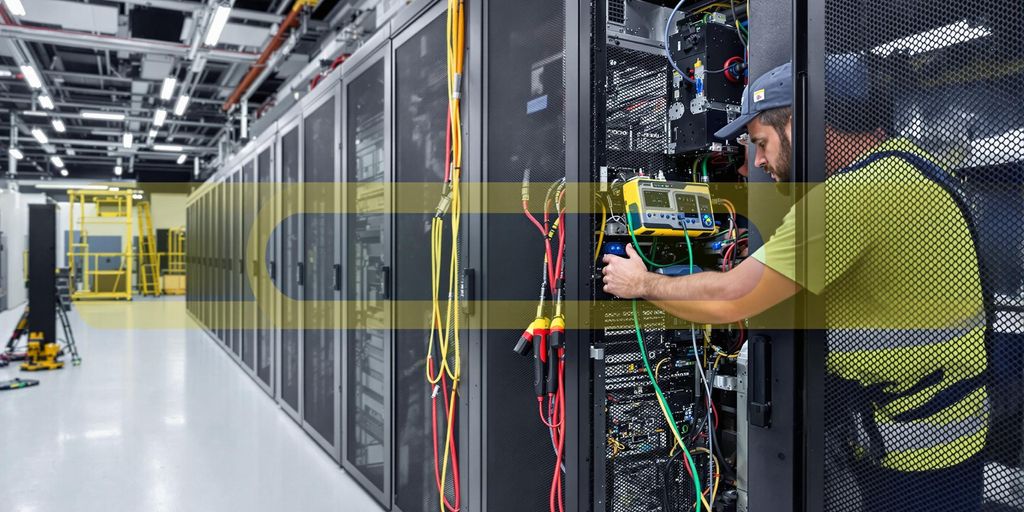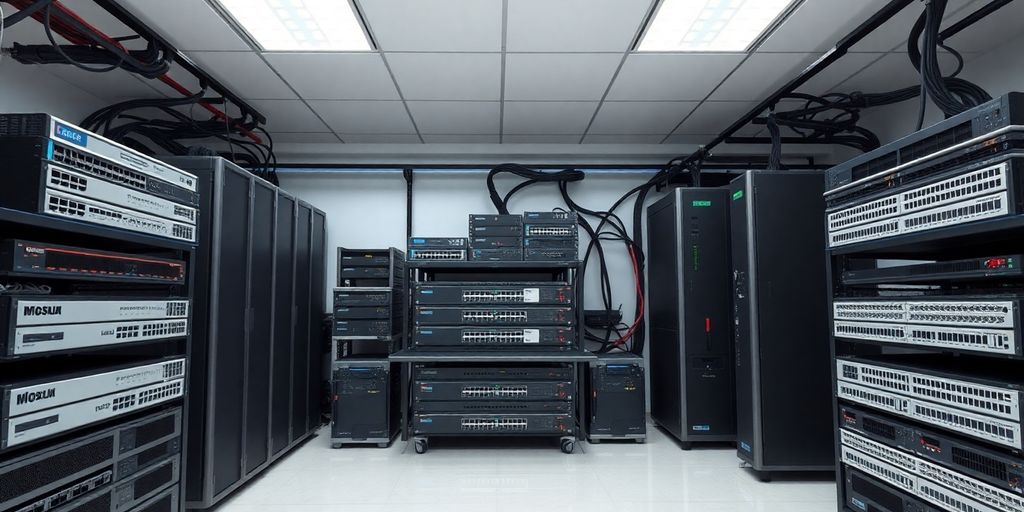In today’s fast-paced business world, keeping the lights on is more than just a figure of speech. It’s a necessity. Power outages can be a nightmare, causing disruptions and financial losses. That’s where UPS Maintenance Services come in. These services ensure your uninterruptible power supply systems are always ready to kick in when the grid fails. Let’s dive into why regular UPS maintenance is crucial for businesses in 2024.
Key Takeaways
- Regular UPS maintenance prevents costly downtime and keeps your business running smoothly.
- Neglecting UPS maintenance can lead to unexpected failures and expensive repairs.
- Routine checks and timely battery replacements are key to maintaining UPS efficiency.
- Advanced technology like remote monitoring can enhance UPS system reliability.
- Choosing the right service provider is essential for effective UPS maintenance.
Understanding The Importance Of UPS Maintenance Services

Defining UPS Maintenance Services
UPS maintenance services are all about keeping your uninterruptible power supply systems in top shape. These services include regular checks, testing, and updates to ensure everything runs smoothly and efficiently. Think of it like taking your car for regular servicing to avoid breakdowns. Routine maintenance is crucial because it helps identify potential issues before they become big problems, ensuring your UPS is always ready to handle power outages.
Consequences Of Neglecting Maintenance
Skipping regular maintenance can lead to some serious headaches. Imagine losing power during a critical business operation—it’s a nightmare. Without proper upkeep, your UPS might fail when you need it most, leading to downtime, data loss, and even equipment damage. In sectors like healthcare or IT, this can have dire consequences, affecting patient care or causing massive data losses. Regular maintenance helps prevent costly downtime, extends equipment lifespan, and safeguards businesses from power interruptions.
Financial Implications Of Downtime
Downtime can hit your wallet hard. Every minute your system is down, you’re losing money. From missed sales to reputational damage, the costs add up fast. For some businesses, an hour of downtime can mean thousands of dollars lost. Investing in regular UPS maintenance might seem like an extra expense, but it’s a smart move. It keeps your operations running smoothly and saves you from unexpected financial hits.
Regular maintenance isn’t just about keeping things running—it’s about protecting your business from unexpected costs and ensuring you stay operational when it matters most.
Key Benefits Of Regular UPS Maintenance Services
Enhancing System Reliability
Regular UPS maintenance is crucial for enhancing system reliability. Routine checks and servicing ensure that your UPS system is always ready to perform when needed. By identifying and addressing potential issues before they escalate, maintenance helps prevent unexpected failures. This proactive approach not only extends the lifespan of the UPS but also assures continuous power supply during critical operations.
- Regular inspections to detect wear and tear
- Timely updates of software and firmware
- Frequent testing of battery performance
Reducing Operational Costs
Investing in regular maintenance can significantly reduce operational costs over time. By preventing major breakdowns, businesses can avoid the high costs associated with emergency repairs and downtime. Maintenance ensures that the UPS system operates efficiently, which can lead to energy savings and reduced utility bills.
- Lower costs compared to emergency repairs
- Improved energy efficiency
- Extended equipment lifespan
Minimizing Unexpected Failures
Unexpected failures can disrupt business operations and lead to significant losses. Regular maintenance minimizes these risks by keeping the UPS system in optimal condition. It includes thorough inspections and timely replacements of components like batteries and capacitors, which are prone to wear out.
- Scheduled component replacements
- Enhanced system monitoring
- Reduced risk of sudden outages
Regular UPS maintenance not only boosts reliability but also cuts costs and minimizes failures, ensuring your business stays up and running without interruptions. Learn more about enhancing reliability with regular UPS maintenance.
Implementing Effective UPS Maintenance Strategies
Routine Inspection Protocols
Keeping your UPS system in top shape starts with regular inspections. Visual checks are crucial to spot any signs of wear or damage. Look for loose connections, corrosion, or any physical wear and tear. It’s not just about looking, though. Battery testing is vital to ensure they hold the right charge. This involves checking voltage, capacity, and discharge rates. Regular testing can help you catch potential failures early.
Battery Care And Replacement
Batteries are the heart of your UPS system, and taking care of them is key. Regular testing and timely replacement are essential. Keep an eye on battery health indicators to know when it’s time for a change. This proactive approach can prevent unexpected failures and extend the life of your system. Remember, a well-maintained battery can save you from costly downtime.
Remote Monitoring Solutions
With technology at our fingertips, remote monitoring is a game-changer. These tools allow for 24/7 tracking of UPS parameters, alerting you to any irregularities before they become big problems. This can help prevent sudden failures and maximize uptime. Consider implementing remote diagnostics to keep your system running smoothly without constant manual checks.
Implementing scheduled preventive maintenance is crucial for effective UPS maintenance and repair. Regular check-ups and inspections should be customized to meet the specific needs of the system.
Leveraging Technology In UPS Maintenance Services

Predictive Analytics For Maintenance
Predictive analytics is like having a crystal ball for your UPS systems. It looks at past data and current performance to predict future issues before they happen. This proactive approach can lead to up to 50% fewer system failures and a 10% cut in yearly maintenance costs. By spotting potential problems early, businesses can plan maintenance without disrupting operations, keeping everything running smoothly.
Remote Monitoring Tools
Remote monitoring tools keep an eye on UPS systems around the clock. They track vital stats and send alerts if something’s off, like a voltage drop or a battery that’s not holding charge. This means you can fix issues before they cause downtime. Plus, it cuts down on the need for regular manual checks, saving time and resources. It’s like having a 24/7 security guard for your power supply.
Energy Efficiency Considerations
Energy efficiency isn’t just about being green; it’s about saving money too. With the right technology, UPS systems can be optimized to use less power, which means lower electricity bills and a smaller carbon footprint. Implementing energy-efficient practices can extend the life of UPS units, reducing the frequency of replacements and cutting down on electronic waste. It’s a win-win for both the business and the environment.
In today’s fast-paced world, staying ahead with technology in UPS maintenance isn’t an option; it’s a necessity. From predictive analytics to energy efficiency, embracing these tools not only ensures reliability but also boosts the bottom line.
Best Practices For UPS Installation And Setup
Strategic Placement Of UPS Systems
When setting up a UPS system, location is everything. Strategic placement ensures that your UPS runs efficiently and is easy to maintain. Consider these key points:
- Accessibility: Make sure the UPS is placed where technicians can easily access it for maintenance. Avoid cramped spaces that might hinder repairs or inspections.
- Cooling: Position the UPS in a well-ventilated area to prevent overheating. This helps in maintaining optimal performance and extends the lifespan of the unit.
- Proximity to Load: Install the UPS close to the equipment it will support. This reduces the length of power cables, minimizing potential energy loss.
Professional Installation Guidelines
Getting your UPS professionally installed can save you a lot of headaches down the line. Here’s why it’s worth considering:
- Compliance with Safety Standards: Professionals ensure that the installation meets all relevant safety and electrical standards, reducing risks of malfunctions.
- Proper Configuration: They configure the UPS settings to match your specific power needs, ensuring optimal performance.
- Warranty Protection: Many manufacturers require professional installation to keep the warranty valid, protecting your investment.
Compliance With Safety Standards
Adhering to safety standards isn’t just about avoiding fines — it’s about protecting your business and employees. Here’s what to keep in mind:
- Regular Inspections: Schedule regular checks to ensure compliance with the latest safety regulations.
- Training: Ensure that your team is trained on emergency procedures related to UPS systems.
- Documentation: Keep detailed records of all maintenance and inspections to demonstrate compliance during audits.
Proper installation and setup of UPS systems is crucial. It not only ensures reliability but also enhances the safety and efficiency of your power management strategy.
Real-World Applications Of UPS Maintenance Services
Case Studies In Healthcare
In healthcare, power is everything. Hospitals rely on UPS systems to keep life-saving equipment running without a hitch. Imagine a surgery room going dark—it’s a nightmare scenario. Preventive maintenance is not just important; it’s critical. Studies show that a good maintenance routine can cut downtime by up to 20%. This means hospitals can keep their lights on, their machines running, and their patients safe.
Success Stories From IT Data Centers
Data centers are the backbone of the digital world. A single hour of downtime can cost companies millions. That’s why many are turning to UPS monitoring software to stay ahead of potential issues. With predictive maintenance, some data centers have seen a 91% drop in unplanned outages. It’s a game-changer, making sure servers stay online and data stays secure.
Impact On Manufacturing Operations
Manufacturing plants can’t afford to stop. Every minute counts, and downtime can mean huge losses. Regular UPS maintenance keeps the lines moving. By focusing on battery health and system diagnostics, manufacturers can avoid unexpected halts. This proactive approach not only saves money but also boosts productivity and ensures that production targets are met without a hitch.
Regular maintenance isn’t just about avoiding downtime; it’s about ensuring that every part of the operation runs smoothly. From healthcare to manufacturing, the benefits are clear: fewer disruptions, more reliability, and peace of mind.
Choosing The Right UPS Maintenance Service Provider
Evaluating Provider Expertise
When you’re on the hunt for a UPS maintenance service provider, it’s critical to assess their technical know-how. Look for providers that have a proven track record with your specific type of UPS systems. Ask about their experience with similar businesses and the types of UPS systems they specialize in. It’s also wise to check their certifications and training programs to ensure they stay updated with the latest technologies.
Understanding Service Agreements
Before signing on the dotted line, dive into the details of the service agreements. These documents should outline the scope of services, response times, and any guarantees or warranties. Make sure you understand what is included in the basic package and what might incur additional costs. It’s also important to clarify the terms regarding emergency services and how quickly they can respond to urgent issues.
Assessing Cost-Benefit Analysis
Cost is always a factor, but it shouldn’t be the only one. Conduct a cost-benefit analysis to weigh the expense of professional maintenance against potential downtime and repair costs. Consider factors like the frequency of maintenance visits and the availability of remote monitoring tools. Such tools can provide continuous oversight and early detection of issues, potentially saving you money in the long run.
Choosing the right UPS maintenance service provider is not just about finding the cheapest option. It’s about ensuring reliability and peace of mind, knowing that your systems are in capable hands. Always prioritize service quality and responsiveness over cost alone.
Conclusion
In wrapping things up, keeping your UPS systems in top shape is more than just a good idea—it’s a necessity for any business looking to avoid costly downtime. Whether you’re a small startup or a large corporation, regular maintenance can save you a lot of headaches and money in the long run. By investing in expert UPS maintenance services, you’re not just ensuring the longevity of your equipment but also safeguarding your business operations against unexpected power failures. So, take the time to assess your current maintenance strategies and consider professional help if needed. It might seem like an extra expense now, but the peace of mind and reliability you’ll gain is worth every penny. Remember, a well-maintained UPS system is a key player in keeping your business running smoothly and efficiently.
Frequently Asked Questions
What is UPS maintenance?
UPS maintenance involves regular checks and services to ensure the uninterruptible power supply system is working properly. This includes inspecting batteries, terminals, and other components to prevent unexpected failures.
Why is UPS maintenance important?
Regular maintenance helps avoid sudden breakdowns, which can lead to costly downtime. It ensures that critical systems remain operational during power outages, protecting both data and equipment.
How often should UPS maintenance be performed?
It varies based on the environment and usage, but generally, quarterly checks and annual comprehensive inspections are recommended to keep the UPS system in good shape.
What are the consequences of neglecting UPS maintenance?
Neglecting maintenance can lead to system failures, resulting in data loss, operational downtime, and potentially expensive repairs or replacements.
Can UPS maintenance reduce costs?
Yes, regular maintenance can lower costs by preventing major failures and extending the life of the equipment, which reduces the need for costly emergency repairs.
What should I look for in a UPS maintenance service provider?
Look for providers with expertise in UPS systems, clear service agreements, and a good track record of customer satisfaction. It’s also important to consider the cost and benefits of their services.



